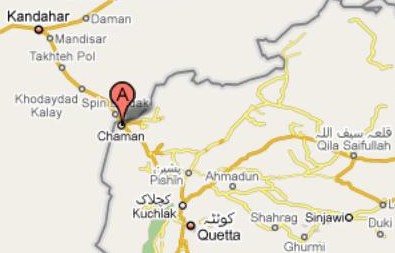By VIRGINIA BYRNE, Associated Press Writer – Mon Aug 31
NEW YORK – A wire-haired dachshund that held the record as the world's oldest dog and celebrated its last birthday with a party at a dog hotel and spa has died at age 21 — or 147 in dog years.
The dog, named Chanel, died Friday of natural causes at her owners' home in suburban Port Jefferson Station, on Long Island.
Chanel, as stylish as her legendary namesake, wore tinted goggles for her cataracts in her later years and favored sweaters because she was sensitive to the cold, owners Denice and Karl Shaughnessy said Monday.
The playful dachshund was only 6 weeks old when Denice Shaughnessy, then serving with the U.S. Army, adopted her from a shelter in Newport News, Va.
Along with her owner, Chanel spent nine years on assignment in Germany, where she became adept at stealing sticks of butter from kitchen countertops and hiding them in sofa cushions in the living room, Shaughnessy said. She also liked chocolate, usually considered toxic to dogs, Shaughnessy said.
"She once ate an entire bag of Reese's peanut butter cups, and, you see, she lived to be 21, so go figure," Shaughnessy added.
Karl Shaughnessy nominated Chanel for the title of world's oldest dog after noticing the Guinness World Records book had no record.
Guinness World Records officials presented Chanel with a certificate as the world's oldest dog at a Manhattan birthday bash hosted by a private pet food company in May.
Chanel loved the party, especially the cake, which had a peanut butter flavor and had been made for dogs, Denice Shaughnessy said.
Chanel exercised daily and ate home-cooked chicken with her dog food, but good care wasn't entirely responsible for her long life, said her owners, who attributed God.
"Dogs are God's angels sent here to look out for us," Denice Shaughnessy said.
A dog from New Iberia, La., named Max, is vying for the record of world's oldest dog. Owner Janelle Derouen said Max marked his 26th birthday on Aug. 9. She said Guinness World Records officials were reviewing documents to authenticate his age; a Guinness World Records official in London didn't immediately answer an e-mail from The Associated Press requesting confirmation of that.
When asked the secret to her dog's long life, Derouen said she was shocked he's still with her.
"I have five kids, and all my kids are grown and gone," she said. "Now my grandkids are playing with this dog."
TAIPEI, Taiwan – China canceled or postponed several events meant to highlight its rapidly improving relations with Taiwan, apparently to protest the Dalai Lama's visit to the island, Taiwan's ruling party said Tuesday.
The Tibetan spiritual leader's visit, aimed at comforting victims of last month's deadly typhoon, has posed the most serious challenge to relations between the island and the mainland since President Ma Ying-jeou took office 15 months ago on a platform of ending 60 years of hostility.
Taiwan's ruling party said it sent an emissary to China last week to try to explain why Ma approved the visit.
"Beijing's attitude toward this is important to us, so we tried to explain to them about Taiwan's thinking," Nationalist Party Deputy Secretary General Chang Rong-kung said.
He did not say how China responded.
China has canceled or postponed at least two planned visits to Taiwan, and nixed ceremonies meant to mark the expansion of direct air service, said Nationalist Party spokeswoman Chen Shu-rong. China had already said its delegation would not join Saturday's opening ceremony for the Deaf Olympics in Taipei.
An official with China Southern Airlines, however, said no ceremony had been planned for the direct flights, saying budgets are tight and such flights have become routine. The official requested anonymity because he was not authorized to speak to media.
Chen told The Associated Press China's actions could be linked to the visit of the Dalai Lama, whom Beijing accuses of seeking independence for his native Tibet.
"We do not exclude the possibility," she said.
Although annoyed by Ma's approval of the visit, China has so far carefully calibrated its response. Communist officials who canceled the visits were not high level, and ongoing economic cooperation with Taiwan was not disrupted.
On Tuesday, the Dalai Lama presided over a mass prayer service in the southern city of Kaohsiung to assuage the pain of Typhoon Morakot, leading some 10,000 worshipers in Buddhist chants.
His remarks were strictly religious, with no mention of politics.
Speaking on the first full day of his visit Monday, the Dalai Lama called on Taiwanese to work hard to preserve their democracy — a comment almost certain to be resented by China's communist leaders.
Beijing dislikes the Dalai Lama because he has a large international following, keeping China's heavy-handed rule over Tibet in the spotlight.
China had warned the Dalai Lama's visit was "bound to have a negative influence on the relations between the mainland and Taiwan" — a far harsher stance than its earlier comment that placed the blame for the trip on Taiwan's pro-independence opposition, rather than Ma.
Taiwan's opposition invited the Dalai Lama to visit and comfort victims of the typhoon, which killed 670 people. Ma later approved it but said he would not meet the spiritual leader.
A number of the Dalai Lama's planned appearances in Taiwan have been scaled back or canceled, prompting media speculation that Ma's government wants to show Beijing it is trying to rein him in.
But Presidential Office spokesman Wang Yu-chi denied the government was behind the program changes.
"His schedule was decided by the Dalai Lama himself, and we respect his decision," Wang said.
China and Taiwan split amid civil war in 1949, but Beijing regards the island as part of its territory. Since taking office last year, Ma has moved Taiwan's economy closer to China's and spoken repeatedly in favor of a peace treaty.
The result has been easing tensions in one of the world's most enduring conflicts.


